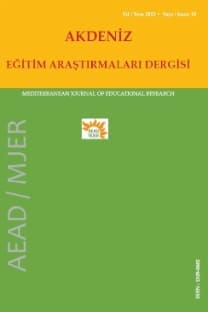English Language Teachers' Perceptions of Common Mistakes: Different Personality Traits
İngilizce Öğretmenlerinin Yaygın Hatalara Dair Algıları: Farklı Karakter Özellikleri
___
Barbetta, P. M., Norona, K. L. & Bicard, D. F. (2005). Classroom behaviour management: A dozen common mistakes and what to do instead. Preventing School Failure: Alternative Education for Children and Youth, 49(3), 11-19.Brophy, J. (1988). Educating teachers about managing classrooms and students. Teaching and Teacher Education, 4(1), 1-18.
Creswell, J. W. (2003). Research design: Qualitative, quantitative, and mixed methods approaches (2nd ed.). Thousand Oaks, CA: Sage.
Dugan, R. R (1961). Personality and the effective teacher. Journal of Teacher Education, 12(3), 335-337.
Feldman, K. A. (1976). The superior college teacher from the students’ view. Research in Higher Education, 5 (3), 243-288.
Feldman, K. A. (1986). The perceived instructional effectiveness of college teachers as related to their personality and attitudinal characteristics. Research in Higher Education, 24(2), 139-213.
Frunza, V. (2014). Implications of teaching styles on learning efficiency. Social and Behavioral Sciences, 127, 342-346.
Gliem, J. A. & Gliem, R. R. (2003). Calculating, Interpreting, and Reporting Cronbach’s Alpha Reliability Coefficient for Likert-Type Scales. Presented at the Midwest Research-to-Practise Conference in Adult, Continuing, and Community Education, The Ohio State University.
John, O. P. & Srivastava, S. (1999). The big give trait taxonomy: History, measurement, and theoretical
perspectives. In L. A. Pervin & O. P. John (Eds.), Handbook of Personality: Theory and Research (pp. 102-138). New York: Guilford Press.
Komarraju, M. & Karau, S. J. (2005). The relationship between the big five personality traits and academic motivation. Personality and Individual Differences, 39, 557-567. Orange, C. (2008). 25 Biggest Mistakes Teachers Make and How to Avoid Them. Thousand Oaks, CA: Corwin.
Tonelson, S. W. (1981). The importance of teacher self-concept to create a healthy psychological environment for learning. Education, 102 (1), 96-100.
Walberg, H. J. (1968). Teacher personality and classroom climate. Educational & School Psychology, 5 (2), 163-169.
Zhang, L. F. (2007). Do personality traits make a difference in teaching styles among Chinese high school teachers? Personality and Individual Differences, 43(4), 669- 679.
- ISSN: 1309-0682
- Yayın Aralığı: 4
- Başlangıç: 2008
- Yayıncı: Tayfun Taşbilek
Sosyal Bilgiler Öğretiminde Kanıt Temelli Öğrenme Uygulamaları
İlköğretim Matematik Öğretmeni Adaylarının Matematiksel Modelleme Becerilerinin İncelenmesi
Sosyal Bilgiler Dersinde Tahmin, Gözlem, Açıklama (TGA) Yönteminin Kullanımı: Örnek Etkinlikler
Sınıf Öğretmeni Adaylarının Tasarım Temelli Öğrenmeye Yönelik Görüşleri
Okul Öncesi Öğretmenlerinin Tükenmişlik Düzeylerinin Sınıf Yönetimi Becerileri ile İlişkisi
Meltem YILDIZ, Püren AKÇAY ÜZÜM
Yap-Boz Sınıf Ortamında 5E Stratejileri Kullanılarak Elementlerin Periyodik Sisteminin Öğretimi
SELİM SONER SÜTÇÜ, HAFİZE KESER
İngilizce Öğretmenlerinin Yaygın Hatalara Dair Algıları: Farklı Karakter Özellikleri
